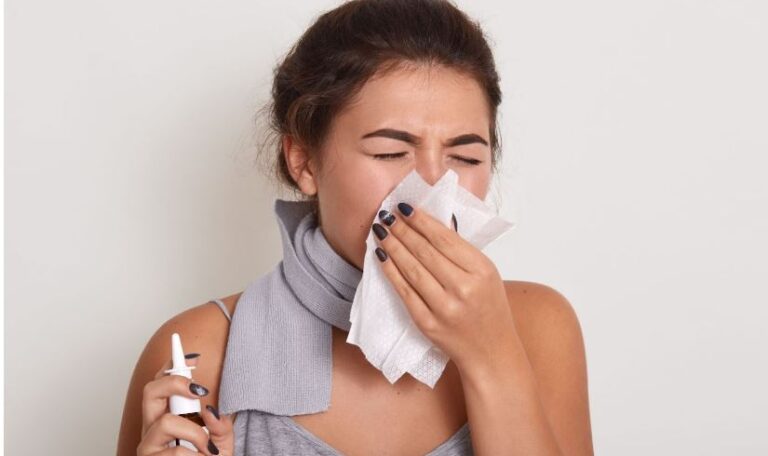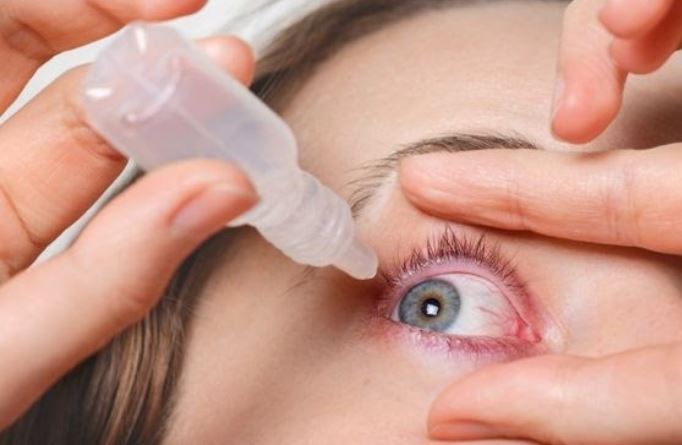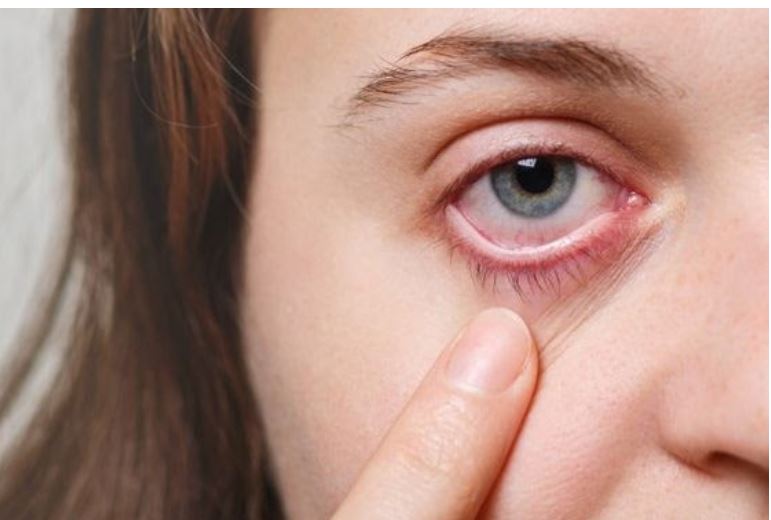Eye allergy is a reaction to the irritating eye. due to a substance such as dust or fume. and therefore, allergy is the body’s defense against any foreign body. that can cause any harm to the eye.
This allergy has symptoms such as itching, redness of the eyes, and excessive tears. but in more severe cases there is another set of symptoms such as eczema and asthma.
Treatment
Antihistamines are the treatment for natural symptoms of eye allergy. But in more severe cases you should consult an ophthalmologist to describe some additional treatments.
Eye allergy contributes to swollen eyes and swollen eyelids. and some simple home remedies can help reduce this swelling, such as cold compresses.
symptoms of Eye allergy

Eye allergy is accompanied by a group of symptoms that are common among patients in general, such as:
- Itchy eyes.
- ِA feeling of burning.
- Red eyes.
- Excessively tears.
- Swollen eyelids.
- Blurred vision.
- Sensitivity to light, especially the very bright light.
- Pain in the eyes.
- Eczema, which is often accompanied by severe itching and dryness.
Sometimes, these symptoms may be accompanied by congestion, runny nose, or sneezing due to irritation and sensitivity in the nose or respiratory system.
Eye allergy symptoms are often confused with the symptoms of one of the other eye diseases called conjunctivitis or Pink Eye. but they are differentiated by the symptoms that may affect the respiratory system in the case of eye allergy.
as we mentioned earlier, which is:
- a runny nose.
- cough.
- or sore throat.
but the distinctive symptom of conjunctivitis is the presence of secretions. that may reach the stage of the patient’s inability to open his eyes. especially in the morning upon awakening.
Causes of eye allergy

Allergens spread in the air such as:
- pollen.
- dust.
- pet dander.
- clothes dander.
- dust.
- smoke.
- fumes.
when the eyes are exposed to them, the immune system secretes a group of anti-allergens, which eventually causes allergic eyes.
if you expose your eye to allergens, the immune system secretes the resistant substance which is doctor calls histamine. it causes many uncomfortable symptoms such as itching, burning feelings. and tears and these symptoms may lead to a runny nose, sneezing, or a sore throat.
Eye allergies can occur at any time and anywhere, but there is an increase in the possibilities and chances of getting injured from it at some times of the year when irritants and allergens abound, such as the spring, the autumn, and the summer.
Eye allergies may also occur due to some other factors such as cosmetics, especially those used in the eyes, and side effects of some medications.
Complications of an eye allergy – Does eye allergy affect vision?
The eye allergy complications don’t lead to serious complications in most cases and do not permanently affect the vision, as its effect is temporary during the period of infection only, and this effect includes blurred vision as a result of eye inflammation.
But in severe cases, the patient can feel some complications as a result of eye allergies, such as giant papillary conjunctivitis, and keratitis which may lead to more serious complications such as scarring and loss of vision.
The difference between eye allergy and conjunctivitis

There is a thin membrane covering the eyeball called the conjunctiva, and sometimes a kind of inflammation occurs, and that conjunctiva becomes inflamed and this condition is known as the pink eye.
There are many similar symptoms between conjunctivitis and eye allergies, such as:
- redness of the eyes.
- excessively tears.
- itching.
but some severe secretions are the most characteristic symptoms of conjunctivitis. and the causes of infection in each case differ from the other, the causes that lead to the pink eye are:
- Bacterial infections.
- Viruses.
- Damaged or not cleaned contact lenses.
- Constant exposure to chemicals.
Why does the eye become allergic?
The conjunctiva is the outer part of the eye that is exposed to air, and therefore it is the most exposed part of the eye to all allergens.
Some people are more likely than others to develop allergies and conjunctivitis who have a history of allergies, whether the eyes, skin or respiratory system.
Top tips for relieving eye allergy symptoms

- Avoid touching your eyes or using your hands to itch. because this contributes to an increase of the antihistamines and anti-allergic cells. which increases the feeling of itching. which in turn may increase symptoms.
- Do not wear contact lenses.
- Do not put makeup on your eyes.
- Avoid exposure to irritants such as dust, smoke, fumes, chemicals, strong odors, and dust.
- Use cold compresses.
- Use artificial tears that are free of preservatives.
- Wash hands frequently to avoid transferring any dirt or infection to the eyes, which may increase the severity of symptoms.
- Drink a mixture of apple cider vinegar with warm water sweetened with honey and you will feel that the symptoms are less severe.
- Do eye exercises to reduce eye fatigue as a result of allergies, those exercises such as frequent blinking and slowly opening and closing the eyes every hour.
Eye twitching causes and how to treat it
Tips for avoiding eye allergy

avoid eye allergies through some simple tips and methods. especially in the summer and spring, when eye diseases are frequent, so you can follow these tips to avoid infection, such as:
- Avoid being outside and in open spaces, especially gardens, to avoid exposure to dust and flying pollen.
- Wear original sunglasses. because their lenses protect against UV rays that affect the eyes with many damages.
- Do not wear contact lenses. and in the case of wearing them. you should wear them only for a short time and be careful to constantly clean them with their solution.
- When staying indoors, close windows and doors. to prevent any dust from getting inside.
- Wash your hands frequently with soap and water to ensure they are clean. and not transmit any microbes, germs, or infection to the eyes.
- In the summer and when the temperature is high. you should stay in places with air conditioning because the high temperature will cause your eyes to irritate. and increase the chances of them developing allergies.
- If you have any pets in the house. you should avoid touching it.
- when you are prone to allergies easily while sleeping makes sure to keep them away from the bedroom. so that its dander does not fly which can infect your eyes with allergies.
- if you have to touch it you should make sure to wash your hands well with soap and water and change your clothes every time you touch them
- Make sure to keep the house clean and mop the floors with soap & water.
- avoid sweeping the floors because that makes you exposed to a lot of flying dust.

